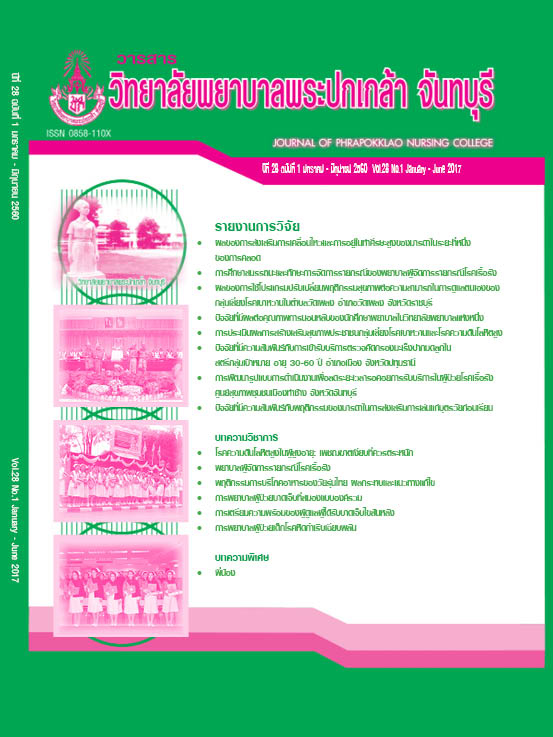Effects of Health Behavior Modifying Program on Ability of Self-care among Risk Group of Diabetes Mellitus in Watphleng Subdistrict, Watphleng District, Ratchaburi Province
Keywords:
Health behavior modification, Ability of self-care, Blood glucose, Risk group of diabetes mellitusAbstract
This quasi-experimental research aimed to examine the effects of health behavior modifying program on ability of self-care. The samples consisted of 66-risk group of diabetes mellitus in Watphleng Subdistrict, Watphleng District, Ratchaburi Province, 34 for an experimental group and 32 for a control group. The experimental group received the health behavior modifying program, while the control group received the conventional nursing care. The research instruments were composed of the health behavior modifying program, a questionnaire of ability of self-care for risk group of diabetes mellitus with the reliability of .88, and a blood glucose meter. The implementation and data collection were conducted from June to August, 2016. Statistics used for data analysis included frequency, percentage, mean, standard deviation, paired t-test, and independent t-test.
The findings revealed that 1) after the experiment, the experimental group had statistically significant higher mean scores of expectation in self-efficacy, expectation in outcomes of self-care practices, and self-care practices than before the experiment (t = 12.060, p < .001; t = 18.770, p < .001 and t = 18.900, p < .001, respectively); 2) after the experiment, the experimental group had statistically significant lower mean blood glucose (DTX) than before the experiment (t = 12.300, p < .01); 3) after the experiment, the experimental group had statistically significant higher mean scores of expectation in self-efficacy, expectation in outcomes of self-care practices, and self-care practices than those in the control group (t = 7.813, p < .001; t = 3.825, p < .001 และ t = 5.050, p < .001, respectively); and 4) after the experiment, the experimental group had statistically significant lower mean blood glucose (DTX) than that in the control group (t = 3.220, p < .01).
This study suggested that health behavior modification should be extended through other risk groups of diabetes mellitus. Additionally, Self-efficacy Theory should be applied for caring in others risk groups of non-communicable diseases.
References
ดวงสมร นิลตานนท์, และจุฬาภรณ์ โสตะ. (2553). ผลของโปรแกรมการส่งเสริมสุขภาพ โดยประยุกต์ใช้ทฤษฎีความสามารถแห่งตนและกระบวนการกลุ่มร่วมกับแรงสนับสนุนทางสังคม ในผู้ป่วยเบาหวานชนิดที่ 2 ในโรงพยาบาลเอราวัณ อำเภอเอราวัณ จังหวัดเลย. วารสารวิจัย มข. (บศ.), 10(3), 51-60.
ดารณี ทองสัมฤทธิ์. (2542). ผลการใช้โปรแกรมกายบริหารแบบไทยต่อการควบคุมภาวะข้อเข่าเสื่อมในผู้สูงอายุ ชมรมผู้สูงอายุอำเภอวัดเพลง จังหวัดราชบุรี (วิทยานิพนธ์ปริญญามหาบัณฑิต). กรุงเทพฯ: มหาวิทยาลัยมหิดล.
ทรงเดช ยศจำรัส, และปาริชา นิพพานนท์. (2556). ผลการพัฒนาความสามารถของตนเองและการตั้งเป้าหมายเพื่อเปรียบเทียบการปรับเปลี่ยนพฤติกรรมการควบคุมระดับน้ำตาลในเลือดของผู้ป่วยเบาหวานชนิดที่ 2 ในโรงพยาบาลชุมแพ อำเภอชุมแพ จังหวัดขอนแก่น. วารสารวิจัยสาธารณสุขศาสตร์ มหาวิทยาลัยขอนแก่น, 6(3), 21-30.
ธมารินทร์ เงินทิพย์. (2553). ผลของการแลกเปลี่ยนความรู้และประสบการณ์เพื่อการปรับเปลี่ยนพฤติกรรมการบริโภคอาหารของผู้ป่วยเบาหวานชนิดที่ 2 โรงพยาบาลกมลาไสย จังหวัดกาฬสินธุ์. วารสารโภชนาการ, 45(1), 175-185.
ธวัชชัย วรพงศธร. (2543). หลักการวิจัยทางสาธารณสุขศาสตร์ (พิมพ์ครั้งที่ 4). กรุงเทพฯ: สำนักพิมพ์แห่งจุฬาลงกรณ์มหาวิทยาลัย.
โรงพยาบาลวัดเพลง จังหวัดราชบุรี. (2559). สถิติผู้ป่วยโรคเบาหวาน โรงพยาบาลวัดเพลง ปี พ.ศ. 2556-2558. ราชบุรี: ผู้แต่ง.
สมมาศ วิไลประสงค์. (2558). การปรับเปลี่ยนพฤติกรรมในกลุ่มเสี่ยงโรคเบาหวานและโรคความดันโลหิตสูง ในพื้นที่ตำบลม่วงงาม อำเภอสิงหนคร จังหวัดสงขลา. วารสารสุขภาพภาคประชาชน, 10(5), 31-38.
อรรถเกียรติ กาญจนพิบูลวงศ์. (ม.ป.ป.). 9 เป้าหมาย และ 25 ตัวชี้วัดระดับโลก. ใน ศิริวรรณ พิทยรังสฤษฏ์. (บ.ก.). รายงานสถานการณ์โรค NCDs ฉบับที่ 2: Kick off to the goals. ม.ป.ท. สืบค้น วันที่ 10 มีนาคม 2560, จาก http://www.dmthai.org/statistic/1846
Bandura, A. (1977). Self-efficacy: Toward a unifying theory of behavioral change. Psychological Review, 84(2), 191.
World Health Organization. (2000). 53th World Health Assembly: Prevention and control of noncommunicable diseases. Retrieved December 25, 2016, from http://apps.who.int/gb/ar-chive/pdf_files/WHA53/ResWHA53/17.pdf
World Health Organization. (2016 a). Fact sheet no. 138. Retrieved December 25, 2016, from http://www.who.int/mediacentre/factsheets/fs138/en/
World Health Organization. (2016 b). Global report on diabetes. Retrieved December 25, 2016, from http://www.who.int/diabetes/publications/grd-2016/en/
Downloads
Published
How to Cite
Issue
Section
License
Copyright (c) 2017 Journal of Phrapokklao Nursing College

This work is licensed under a Creative Commons Attribution-NonCommercial-NoDerivatives 4.0 International License.
เนื้อความ ข้อมูล และรายการอ้างอิงที่ผู้เขียนใช้ในการเขียนบทความเพื่อลงตีพิมพ์ในวารสารวิทยาลัยพยาบาลพระปกเกล้า จันทบุรี ถือเป็นความคิดเห็นและความรับผิดชอบของผู้เขียน คณะผู้จัดทำวารสารไม่จำเป็นต้องเห็นพ้องด้วยหรือร่วมรับผิดชอบ
บทความที่ได้รับการลงตีพิมพ์ในวารสารวิทยาลัยพยาบาลพระปกเกล้า จันทบุรี ถือเป็นลิขสิทธิ์ของวารสารวิทยาลัยพยาบาลพระปกเกล้า จันทบุรี หากหน่วยงานหรือบุคคลใดต้องการนำส่วนหนึ่งหรือทั้งหมดของบทความไปเผยแพร่ต่อเพื่อวัตถุประสงค์ใด ๆ จะต้องได้รับอนุญาตจากบรรณาธิการวารสารก่อน



